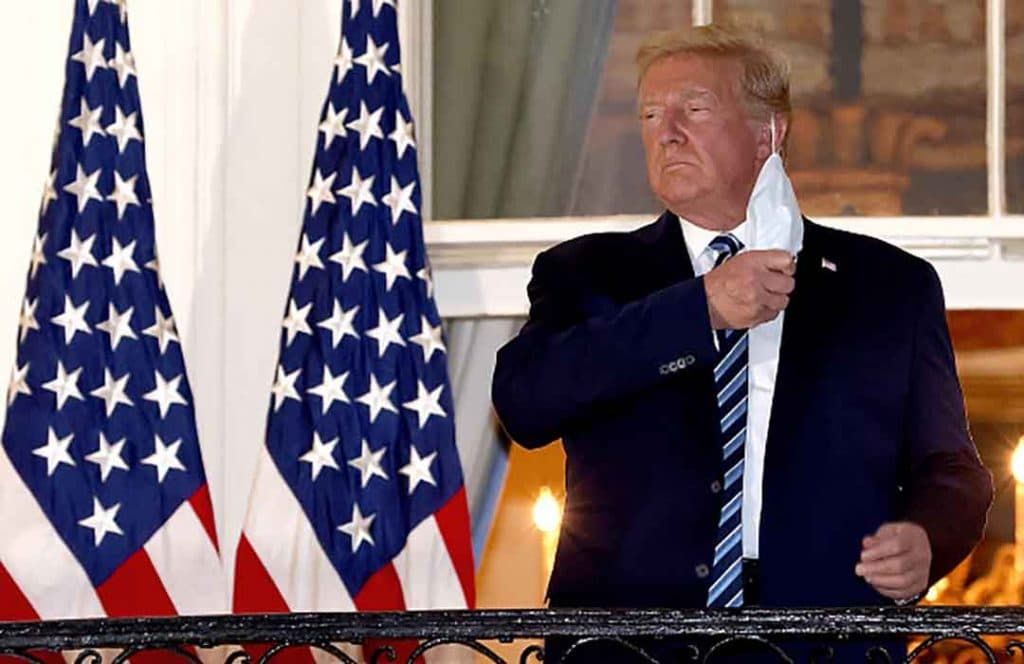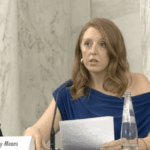What Trump might do on vaccines, pandemics, global health, and more
By Matt Field | November 6, 2024
 Former president Donald Trump removes his mask upon return to the White House from Walter Reed National Military Medical Center on October 05, 2020 in Washington, DC. Trump spent three days hospitalized for coronavirus. (Photo by Win McNamee/Getty Images)
Former president Donald Trump removes his mask upon return to the White House from Walter Reed National Military Medical Center on October 05, 2020 in Washington, DC. Trump spent three days hospitalized for coronavirus. (Photo by Win McNamee/Getty Images)
“I’ll make a decision,” Donald Trump said about whether to ban certain vaccines—before winning the presidential election Tuesday. He said he would do so after talking to Robert F. Kennedy Jr., the prominent anti-vaccine activist. The comment was only one of many that have given experts in public health and related fields heartburn. While last in office, after all, Trump presided over the first year of the COVID-19 pandemic when he was frequently dismissive of the scientists working to tame the crisis.
Though the COVID pandemic has receded in the public consciousness, the challenges the future Trump administration will face from infectious diseases have certainly not. The spread of H5N1 avian influenza in farm animals and a new strain of mpox in parts of Africa raise the specter of future outbreaks and possible pandemics. New capabilities in artificial intelligence (AI) and emerging biotechnologies, meanwhile, could create biological risks that rival those that might arise naturally.
The Bulletin reached out to a variety of experts in public health, biosecurity, vaccine policy, and other biology-related fields and asked them to share their take on Trump’s win and what it might mean for their areas of practice and research. Their responses will be published below, as they come in.
An isolationist on global health
Donald Trump’s win on Election Day raises the possibility that the United States will pursue isolationism not just in economic or military policy but also in health affairs. The United States remains the largest voluntary financial contributor to the World Health Organization (WHO), but withdrew its participation in the organization during the first Trump presidency. A similar decision would destabilize the most important health-related international organization not only in financial terms but also in terms of international acceptance of its authority. Similarly, we should expect that funding for an important global health initiative begun during George W. Bush’s presidency, the President’s Emergency Plan for AIDS Relief (PEPFAR) as well as active participation in other international health-related initiatives will also be at risk. Withdrawing or reducing US support for the WHO and cutting funding for other health programs will put in jeopardy critical achievements against infectious diseases.
I don’t believe that Robert F. Kennedy Jr. will be an integral part of the coming Trump administration, but rogue opinions and disinformation have already been normalized through Trump-Kennedy interactions. I expect that more Americans will share Kennedy’s vaccine skepticism four years from now, and if school vaccine mandates are no longer strongly supported, we can expect the resurgence of preventable childhood infections. (On the other hand, if Kennedy does get an important appointment, and the scenario evolves, then the United States will proceed down a path of fatal science denialism, just as the former Soviet Union did under the influential biologist Trofirm Lysenko, who’s contrarian views on genetics led to the persecution of scientific critics and a retrenchment in Soviet science.)
–Georgios Pappas is a physician who’s research focuses on zoonoses, epidemic preparedness, and the social aspects of infectious diseases.
A deeply concerning result for public health
Right now, I think you’d be hard-pressed to find many in public health, healthcare, and pandemic preparedness/response, who are not deeply concerned. The recent notion that Robert F. Kennedy Jr. could be in charge of public health for the United States poses a real danger. From his claims that vaccines are harmful or unnecessary to his proposed efforts to remove fluoride from public water systems, Kennedy continuously pushes anti-science rhetoric and dis/misinformation.
History has shown us what might happen under another Trump administration during times of crises, from extreme weather events to a pandemic. We have seen how an administration that pits itself against science and dedicated public service officials reacts. As we face an ongoing H5N1 outbreak, persistent outbreaks of emerging infectious diseases, an erosion of trust in public health, a rise in dis/misinformation, and widening social disparities, we need leadership that will unite rather than divide.
We are at a critical time in forming effective and pragmatic policies to address complex issues such as the ways in which developments in artificial intelligence (AI) will affect biosecurity, the safety and security around critical research of dangerous pathogens, the effects of climate change on infectious diseases, and the need to strengthen global health through equity and partnership.
Developing policies in these areas will require strategies based on collaboration and evidence-based measures–not inflammatory, inaccurate, and harmful rhetoric that furthers partisan divides and enflames social discourse. It’s our responsibility to find a path that ensures the protection of public health and global health security. We’ve got a lot of work to do, and I fear a hard road ahead of us.
–Saskia Popescu is an assistant professor in the Department of Epidemiology & Public Health at the University of Maryland School of Medicine.
Will Trump have quality scientific advice?
The next four years will see a continued need to respond to disease outbreaks domestically, for example, the H5N1 avian influenza spreading in pigs, cattle, and poultry and internationally, where pathogens such as the Marburg virus or mpox are circulating. Meanwhile, biotechnology and artificial intelligence (AI), continue to develop rapidly, presenting both risks and benefits for pandemic preparedness and other fields. To address outbreaks and remain economically competitive, the United States should press for further investment in the biotechnology sector. The country needs to continue to monitor the effects of artificial intelligence (AI) tools on biology.
A president should have strong scientific advice to tackle these issues. But Donald Trump has indicated plans to reclassify federal employees from permanent positions to appointee positions, which would be likely to reduce the amount of long-term, non-partisan scientific expertise available to policymakers. Trump’s policy preference will be compounded by the Supreme Court’s overturning of the so-called “Chevron doctrine” in June, under which federal agencies had leeway in translating laws into regulation. The ruling promises to transfer even more power away from experts and toward political appointees, reducing the ability of scientists to meaningfully advise on policy.
Trump was president when COVID began, but despite the severity of the pandemic and the damage it inflicted on his own presidency, he has promised to disband the Office of Pandemic Preparedness and Response Policy, which would reduce the United States’s ability to prepare for new pandemics. His statements about the cost borne by the country in global alliances like the World Health Organization (WHO), which he set about pulling the United States out of during his term, indicates that he may restrict US foreign aid that goes toward addressing global health issues.
There is a substantial risk of Trump appointing a non-scientific secretary of Health and Human Services, which could derail vaccine development and uptake as well as domestic health funding and priorities that conflict with the appointee’s personal beliefs. Although Trump’s statements on the campaign trail may not reflect what he actually does, he has mentioned things like banning vaccines and appointing the anti-vaccine activist Robert F. Kennedy Jr. as secretary of Health and Human Services. Such statements indicate a concerning and cavalier attitude toward public health and pandemic preparedness.
–Allison Berke is a bioengineer and the director of Chemical and Biological Weapons Nonproliferation at the Middlebury Institute of International Studies at Monterey.
How the next Trump presidency could impact immunizations
The first Trump administration invested billions of dollars in vaccine research and development to combat COVID-19, leading to what was arguably the most successful vaccine development program in history. This investment in American innovation and biotechnology, including mRNA vaccines, saved countless lives and has the potential to revolutionize the prevention and treatment of serious diseases. However, Trump also weakened public trust in science and threatened health agencies with funding cuts that could have compromised vaccine programs and outbreak monitoring—cuts that Congress had to override repeatedly.
Now, a second Trump administration could jeopardize our ability to defend our families from disease, putting human lives and local economies at serious risk. Talk of repealing laws like the Affordable Care Act could strip vaccine access for millions, especially vulnerable groups like seniors who rely on Medicare for free vaccines. In addition, the conservative presidential transition project known as Project 2025 advocates for the dismantling of vaccine requirements and removing the Center for Disease Control and Prevention (CDC)’s role in setting the national vaccine schedule, putting children at risk by allowing preventable diseases to resurface in schools. Project 2025 also calls for ending the use of long-established cell lines in vaccine development—a move based on outdated misconceptions about science. Major religious groups support vaccines, and these cell lines have contributed to lifesaving medical advancements.
Of course, there is also the question of Robert F. Kennedy Jr.’s potential role in the Trump administration. Kennedy runs one of the nation’s largest anti-vaccine organizations and has promoted long debunked conspiracy theories about childhood immunizations that are again gaining a foothold in public discourse. Trump has signaled support for Kennedy’s spurious claims and Kennedy claimed that Trump would give him control over health agencies, including the CDC.
Overall, we could see a dismantling and restructuring of federal health agencies, which would fundamentally alter our national health policies and disrupt—or even reverse—the progress we have made in preventing many vaccine-preventable diseases. Now is the time for the pro-vaccine majority to make their support for immunizations heard. SAFE Communities Coalition and our Families for Vaccines state chapters will continue to advocate for immunizations policies based on science and evidence. The same policies that helped the United States to eliminate many vaccine preventable diseases—diseases we don’t want to see our children needlessly suffer from.
–Jennifer Herricks and Crystal Rommen. Herricks is the advocacy director for the SAFE Communities Coalition and founder of Louisiana Families for Vaccines, where Rommen is a board member.
Less access to health care and worse public health
Donald Trump’s first term as president came to a tumultuous end in 2020 during the COVID-19 pandemic. The prospect of his return to office now raises an array of public health repercussions for millions of Americans.
Let’s start with vaccines. During the pandemic, the Trump administration’s key achievement was developing COVID-19 vaccines in less than eight months. Even though Trump was inoculated and subsequently encouraged others to follow suit, he and his right-wing health advisor, Robert F. Kennedy Jr., now spew anti-vaccination messages. They have proposed rolling back vaccine mandates, deconstructing the Centers for Disease Control and Prevention (CDC), and gutting its budget.
Americans’ access to additional health services through the Affordable Care Act (ACA) is also at risk. Congressional leaders have again targeted the act, sometimes called “Obamacare” for repeal and replacement, despite unsuccessful prior attempts during Trump’s last administration. Rescinding the act’s protections is politically unpopular. Yet the coming Trump administration seems committed to assuring health care access remains “for sale” in the United States, and not simply handed out. Expect diminutions in access to programs like Medicaid or Medicare, critical health safety nets for low income people and the elderly, respectively. Higher health care costs means less access, which will contribute to diminished public health outcomes.
The cumulative impacts of these and other anti-public health strategies and initiatives, including potential limits on abortion access or reversals of climate change policy, are entirely predictable. Americans may experience lowered rates of life expectancy. Millions will needlessly suffer. And excess deaths due to ill-advised, non-scientific, unproven, and punitive policies are going to rise absent resistance and derailments of planned interventions.
–James G. Hodge, Jr. is the Peter Kiewit Foundation Professor of Law and the director of the Center for Public Health Law & Policy at the Sandra Day O’Connor College of Law at Arizona State University (ASU).
Less biosecurity regulation and oversight to come
As the Trump administration assumes its offices next year, we can expect to see a general loosening of federal biosecurity regulation and oversight across various sectors.
US agricultural biosecurity, the protection of plants and animals from disease threats, will not significantly change. Congress has generally allowed the food industries to regulate themselves while keeping an eye on food imports to the United States. The Trump administration will likely not engage in this area.
With regards to laboratory biosecurity, despite the past debates over the origins of the COVID-19 virus, there will be no advances to improve US laboratory biosecurity or biosafety. Given the significant growth of biological research within the United States, we ought to see more federal regulation and transparency to ensure safe practices across the nation. Instead, we should expect to see the Trump administration waive or reduce biosecurity regulations that might impinge on US pharmaceutical and biotechnology firms’ research and development efforts. China’s continued dominance in synthetic biology will be a motivating factor to limit federal restrictions on US firms so as to allow them to compete internationally in this area.
As for military biodefense, the Pentagon conducted a Biodefense Posture Review in 2022 that included plans to enhance biosecurity and biosafety at its relatively few biological research facilities. But if the Trump administration seeks to reduce excessive government oversight and improve military readiness against biological warfare, it should eliminate future reviews and the excessive management structure created by this annual reporting while directing the offices in the military to work with the Defense Health Agency to maintain proper management of its biosafety labs.
–Al Mauroni is a senior policy analyst with 40 years of experience with US military chemical and biological defense and is the author of BIOCRISIS: Defining Biological Threats in U.S. Policy.
The next four years: Worst-case scenarios and potential surprises
What does a second Trump administration mean for international biosecurity? There are many who are concerned that the administration will disengage and defund global health security and bio-preparedness activities. They fear the United States will withdraw from the political and technical discussions on cutting edge biotechnology as well as biological disarmament where the country has traditionally played a key leadership role.
A worst-case scenario is that President-elect Donald Trump will make good on earlier threats to cut funding to the World Health Organization (WHO) or even disband its membership. Similarly, the Trump administration might use previous US claims that the Biological Weapons Convention (BWC), the global treaty banning biological weapons, is unverifiable and that certain states are in non-compliance as an excuse not just to torpedo current efforts to strengthen the treaty, but to abandon it entirely.
Yet, however easy it is to focus on potential negatives, it is also possible that opportunities may arise from having a significant disruptor like Trump in power. Tump’s front seat to the COVID-19 pandemic may well have shaped his understanding of the need for international cooperation in preparing for and responding to disease outbreaks, whether natural, accidental, or deliberately caused and impressed upon him that the United States has an interest in remaining a leader in this field. Disruption could, for instance, stimulate new bio-initiatives among new configurations of states, or new patterns of cooperation. There could be areas where Trump can bring Russia into a more constructive role internationally. We have, for instance, repeatedly been told that Trump will end Russia’s war in Ukraine. Could part of a new deal with Russia involve an agreed understanding to move out of the cycle of baseless bioweapons accusations, disinformation, and misuse of multilateral forums? Or an understanding that, just like nuclear security and energy infrastructure are fundamental to sustained nuclear disarmament, ensuring the integrity of health security infrastructures, including public health laboratories and hospitals, must be part of a deal?
At this stage, it is unclear what to anticipate, but anticipating surprise seems a good bet.
–Filippa Lentzos is an associate professor in Science & International Security at King’s College London.
Keep attention on the convergence of AI and the life sciences
Several key global health security priorities will require the new Trump administration’s attention. Given rapid advances in capabilities at the interface of artificial intelligence (AI) and the life sciences, the new administration should maintain a significant focus on safeguarding emerging capabilities so we can reap the potential societal benefits while reducing the risks of deliberate or accidental misuse. This includes, for example, supporting a robust research agenda to explore new guardrails for protecting this developing scientific and technical area, so it is not exploited by malicious actors.
More broadly, governance and oversight of dual-use research of concern and research to enhance potentially pandemic pathogens, sometimes called “gain-of-function research,” is crucial. This is a bipartisan goal; it has been a priority for Republicans in Congress for several years, and it is reflected in the 2018 National Biodefense Strategy released by the first Trump administration. The 2023 National Science Advisory Board for Biosecurity report that recommended broadening oversight of these areas of research coupled with the 2024 White House policy that put several of these recommendations into practice are important steps in the right direction. However, additional work in the coming years will be necessary to make sure that new government oversight systems are working well in practice and that they are providing meaningful protections against accidental or deliberate misuse of bioscience and biotechnology.
It will also be vital to ensure that the United States strengthens its capabilities to detect and rapidly respond to the growing threat posed by H5N1 avian flu and other viruses with pandemic potential. The Biden administration has taken important steps to advance this goal, but they have not done nearly enough. For example, it is important to develop more robust biosurveillance capabilities for use on US farms, so we can protect farm workers who may be exposed and rapidly detect the emergence of new deadly infectious disease threats to the broader population. It will be critical for the Trump administration to continue to protect America from this potential national security threat.
To protect Americans at home and our allies abroad, it will be vital to work with key international partners to build global health security capacity– because infectious diseases don’t respect borders. This was outlined in the Global Health Security and International Pandemic Prevention, Preparedness and Response Act of 2022, which was led by Sen. James Risch (R-Idaho). Global health security is vital to our national and economic security. Given the devastating economic losses caused by COVID-19, it is in the Trump administration’s and in America’s interest to invest in global health security capacity as a highly cost-effective way to protect the US economy from the shocks and massive losses that a future pandemic could cause.
–Jaime M. Yassif is the vice president of NTI Global Biological Policy and Programs (NTI | bio).
Learn the bipartisan lessons of the past to prevent future biological crises
For decades, American presidential administrations of both parties have made combatting biological threats a priority on their national security to-do list. In 2020, I spoke out about President Donald Trump’s mishandling of the COVID-19 pandemic and dismissiveness towards bipartisan lessons and preparedness tools his team received when he entered office. Though no administration could have been perfectly prepared for COVID, the results of Trump’s disregard were predictable; when the virus struck, chaos ensued. Instead of uniting in the face of crisis, states and cities were left divided and competing for scarce resources. Americans suffered and lives were lost as a result.
Looking forward, important new plans and response playbooks have emerged not only from COVID-19, but from the many additional outbreaks the United States has fought over the last four years from mpox to H5N1 influenza, to Marburg. I draw hope from state and local innovations, such as those uncovered by the American Democracy and Health Security Initiative. The federal government and our nation’s governors, mayors, tribal leaders, school administrators, businesses and community organizations learned precious lessons, which must be preserved. The path ahead for our nation’s biodefense is clear: we must lean into and build on this vital work.
In this spirit, the administration should reject a biosecurity to-do list that sows divisiveness, driving Democrats and Republicans into their respective corners and failing to capitalize on hard-fought lessons from states, cities, and tribes. Instead, it should adopt a bipartisan biosecurity agenda that protects all Americans by onshoring and friend-shoring critical supplies, while simultaneously bolstering global financing solutions that enable low- and lower-middle-income countries to access countermeasures and stop outbreaks at the source. It should double down on investing in the 100 Days Mission, an effort built on Operation Warp Speed, achieve safe and effective vaccines, tests, and treatments for every potentially pandemic pathogen. And it must strengthen preparedness to deter and guard against the potential for deliberate or accidental biological misuse.
Such an agenda would recognize that biological disasters affect everyone, everywhere, all at once and that Americans can only be safe from disease threats if diseases are fought and stopped everywhere in the world. Crucially, this means doubling down on the US target to assist at least 50 countries with health security capacity and catalyze capacity in 50 more through a strong Pandemic Fund. It would require not only remaining at the table in the World Health Assembly, the governing body of the World Health Organization (WHO), but also using that seat to play a stronger leadership role in advancing global health security. Conversely, walking away would have negative impacts on Americans and create space for competitors and adversaries that seek harm to our interests. And it would mean working to build the world’s strongest bioeconomy, safeguarding emerging biotechnologies against deliberate and accidental misuse, and building capacity to detect and respond to disease threats around the world.
Finally, to achieve these goals, the incoming administration must adopt and invest in the work of the National Security Council’s Directorate on Global Health Security and Biodefense and the White House Office on Pandemic Preparedness and Response. These non-partisan experts have spent years building a national and global firefighting team to enhance American readiness for biological threats. This team should be empowered and expanded, not shuttered.
It’s highly likely the incoming administration will have to deal with a major health emergency very early in its tenure. In 2025, we will learn whether the new administration will pick up where it left off or whether it can turn the page on past pandemic performance and prevent future biological catastrophes.
–Elizabeth (Beth) Cameron is a professor of the practice and senior advisor to the Pandemic Center at the Brown University School of Public Health.
Together, we make the world safer.
The Bulletin elevates expert voices above the noise. But as an independent nonprofit organization, our operations depend on the support of readers like you. Help us continue to deliver quality journalism that holds leaders accountable. Your support of our work at any level is important. In return, we promise our coverage will be understandable, influential, vigilant, solution-oriented, and fair-minded. Together we can make a difference.
Keywords: 2024 presidential election, Trump
Topics: Biosecurity















We already know what will be done about vaccines, pandemics and health in general: Robert F. Kennedy Jr. has been promised absolute control over health in the US. He thinks – all – vaccines are dangerous and that no vaccine has ever worked. He believes vaccines are a hoax. He will have total power over the health policies of the United States. He will control the CDC, and more. And this is not the end of his insane beliefs, but only the beginning. We will see a completely dysfunctional health system that will rely on crystals and prayers while disregarding… Read more »